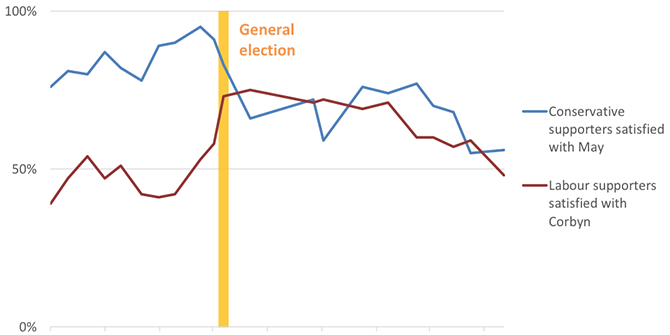 The Labour Party is keen to show it is ready to form a government, but historic questions still hang over the Labour leadership. Christopher Kirkland identifies four issues that are crucial to the future of Keir Starmer and the party he leads.
The Labour Party is keen to show it is ready to form a government, but historic questions still hang over the Labour leadership. Christopher Kirkland identifies four issues that are crucial to the future of Keir Starmer and the party he leads.
Ahead of their annual conference in Liverpool, Labour will be buoyed by opinion poll leads. However, underlying these, Kier Starmer still trails Liz Truss in voters responses to the question ‘who would make the best Prime Minister?’ Critics argue that he is indecisive, has abandoned pledges made in the Labour leadership contest, and failed to unite the party or ignored key issues, in favour of the so-called “culture-war”.
Conference offers a platform for Starmer to address some of these points. Though it also establishes potential pitfalls. Once such questions are answered they will, in the words of Neil Kinnock, “be pickled into a ridged dogma, a code” forcing those who hold them to “go through the years sticking to [them, even if they become] out-dated, mis-placed, irrelevant to the real needs.” And this is likely to be used to criticise Starmer should the situation change prior to election day.
However, not doing also poses risks. Perceived inaction at a moment of national crisis would make Starmer, and the Labour Party, appear weak. Labour’s return to office, after prolonged periods in opposition, have historically been based upon ‘big ideas’ – Building a New Jerusalem (1945), The White Heat of Technology (1964), New Labour and sound economic management (1997) – failing to offer something akin to a paradigm shift that can both conceptualise and overcome the UK’s current economic problems would cede political advantage to the Conservatives and leave Labour on the backfoot.
Whilst Labour’s divisions are less than they have been historically, conference season is a key test of a leader’s ability to rally the faithful. Labour Party conferences have often provided distinctive moments in the Party’s history (e.g. Gaitskell’s “Fight and Fight and Fight again” speech in Scarborough in 1960, Callaghan’s renunciation of Keynesian economics in Blackpool in 1976 or Kinnock’s denouncement of the militant tendency in Bournemouth in 1985). A lot has changed since Starmer, in his first (in person) conference party speech outlined his principles as “Work, Care, Equality [and] Security.” and Labour will be keen to show it is ready to form a government.
Yet it is wrong to suggest Starmer or his allies have a clean slate from which to operate. Traditional (or historic) questions still hang over the Labour leadership. Debates surrounding Starmer’s ideological positions, or the relationship between the party and the trade unions remain unresolved and have the potential to derail Labour’s opinion poll leads. These are debates that have not been resolved (though other questions such as the Party’s commitment to Parliament have been), since the interwar period.
My new book demonstrates how the Labour Party’s ideology has been forged amidst crises. In this vein, Starmer has plenty to draw upon, such as COVID-19 and the sleaze associated with Johnson’s government, inflationary pressures, and the cost-of-living crisis. The book highlights four core themes; Labour’s definition of socialism, the role of the state in economic decision making, the party’s understanding of inequalities, and its relationship with the trade union movement. Voters will be looking to Starmer for hints as to his, and the Labour Party under his leadership, responses to each of these.
What is socialism?
Other leaders explicitly stated what socialism meant to them, paying homage to the line from Labour’s 1945 manifesto, which asserted that “the Labour Party is a socialist party and proud of it”. Even Tony Blair, in 1994, explicitly set out his understanding of socialism in a Fabian pamphlet, and did not shy away from using the term. Starmer has so far sought to avoid setting out his ideas in using such terminology – his conference speech last year did not mention the word socialism – for fear of either alienating a large wing of the party or being characterised in the same light as his predecessor. Failing to engage in such discourse risks alienating some of Labour’s traditional voters.
The role of the State in economic decision-making
Linked to this is the power of the state in economic decision-making – can/should the state simply “correct” market failures? Should it provide certain services; if so, which ones? And how should these be decided/organised? Spiralling energy prices have led calls for greater intervention in the energy industries. Starmer has already indicated that Labour may apply different taxation rates to energy companies than those in other industries, but amidst rising prices, pertinent questions remain over the assistance the government could/should offer to sectors such as housing (including rents), food, health (amidst record NHS waiting times)? Simply offering more is not an option; the last Labour government fell in 2010 following a crisis that the Conservatives were able to define as one of excessive government spending and would be quick to highlight any unfunded promises by Starmer or his team.
Inequalities
One key tension within the Labour Party is the distinction between equality of outcome and equality of opportunity. This links to the previous question about how far the state should intervene in economic matters. Traditionally, Labour’s leaders have come from the right of the party and been more comfortable defining equality in terms of equality of opportunity. However, as the cost-of-living crisis continues into the winter and metrics such as poverty (both in absolute and relative terms) increase, so too will calls for greater state action to support those on lower wages/incomes. Additionally engaging with such debates could help Labour distance themselves from the Conservatives and in particular plans to lift the cap on bankers bonuses.
Labour’s relationship with the trade union movement
More visible, amidst mounting industrial unrest, is the question over the relationship between the party and the trade unions. During Labour’s last period in opposition one commentator famously described this as a ‘contentious alliance’, due to the often fractious relationship between the two groups, but also the scrutiny other parties offered to the relationship. However, as others have pointed out, the contention contained within the relationship is borne not only out of events, but also the myths and narratives that become associated with such events.
Starmer’s decision to order Labour’s front bench from attending picket lines over the summer was far from universally welcomed, and some prominent members even saw fit to defy the leader’s orders. Amidst high inflation, Labour will face pressure to offer support to workers facing real terms pay cuts. As Callaghan found out in 1978/9, in a battle between inflationary pressures and wage moderation, neutrality is akin to favouring the latter. Failing to offer support to such groups over the winter as the cost-of-living crisis escalates will be predicated on the basis that such voters will still come out to mark an X next to their local Labour candidate (or that those put off from voting Labour will be insufficient in number to cost the party seats at the next election).
As the next general election approaches, the date of which has to be set by the end of 2024, calls for Starmer to address these questions will grow. As the country faces continued crises, the answers become increasingly pertinent. Yet Einstein’s famous phrase “In the midst of every crisis, lies great opportunity” will offer Starmer succour, for the leader of the opposition is not short of crises upon which to base his vision. If he is able to address the four questions listed above, he has the potential to situate his leadership within the broader framework of the Labour Party, unite the party, and present himself as a Prime Minister in waiting.
Note: The above draws on the author’s book Labour’s Economic Ideology Since 1900, Bristol University Press (2022).
_____________________
 Christopher Kirkland is Lecturer in Politics at York St John University.
Christopher Kirkland is Lecturer in Politics at York St John University.
Photo by Jessica Taylor/UK Parliament, under a CC-BY-NC 2.0 licence







